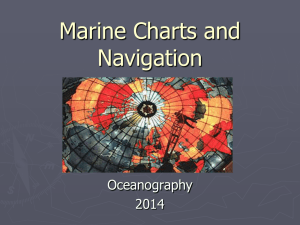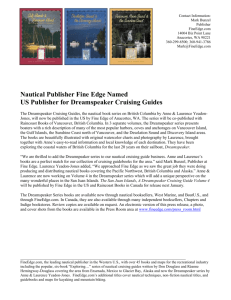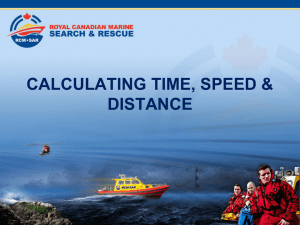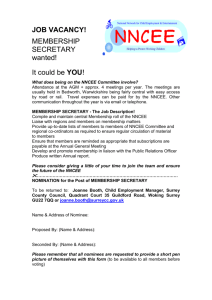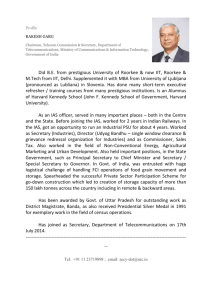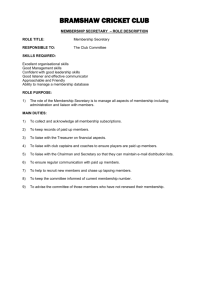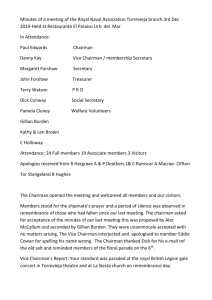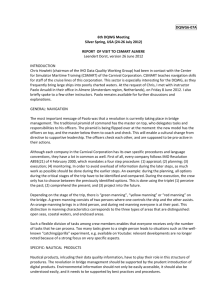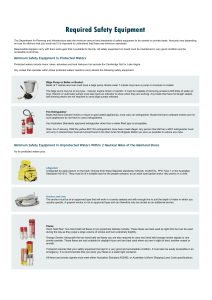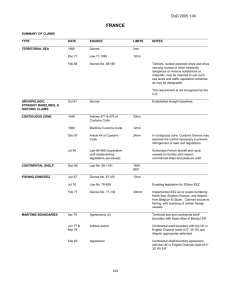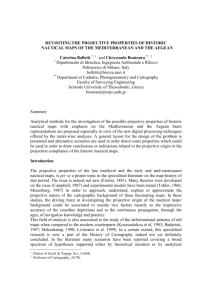DPTEG Terms of Reference
advertisement
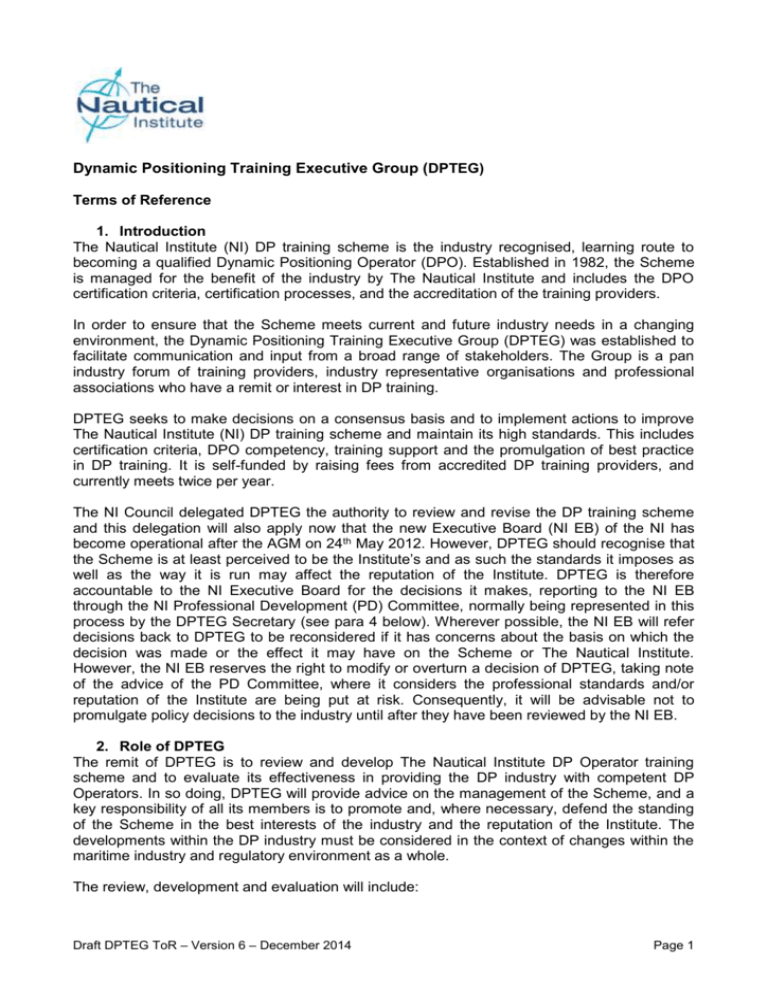
Dynamic Positioning Training Executive Group (DPTEG) Terms of Reference 1. Introduction The Nautical Institute (NI) DP training scheme is the industry recognised, learning route to becoming a qualified Dynamic Positioning Operator (DPO). Established in 1982, the Scheme is managed for the benefit of the industry by The Nautical Institute and includes the DPO certification criteria, certification processes, and the accreditation of the training providers. In order to ensure that the Scheme meets current and future industry needs in a changing environment, the Dynamic Positioning Training Executive Group (DPTEG) was established to facilitate communication and input from a broad range of stakeholders. The Group is a pan industry forum of training providers, industry representative organisations and professional associations who have a remit or interest in DP training. DPTEG seeks to make decisions on a consensus basis and to implement actions to improve The Nautical Institute (NI) DP training scheme and maintain its high standards. This includes certification criteria, DPO competency, training support and the promulgation of best practice in DP training. It is self-funded by raising fees from accredited DP training providers, and currently meets twice per year. The NI Council delegated DPTEG the authority to review and revise the DP training scheme and this delegation will also apply now that the new Executive Board (NI EB) of the NI has become operational after the AGM on 24th May 2012. However, DPTEG should recognise that the Scheme is at least perceived to be the Institute’s and as such the standards it imposes as well as the way it is run may affect the reputation of the Institute. DPTEG is therefore accountable to the NI Executive Board for the decisions it makes, reporting to the NI EB through the NI Professional Development (PD) Committee, normally being represented in this process by the DPTEG Secretary (see para 4 below). Wherever possible, the NI EB will refer decisions back to DPTEG to be reconsidered if it has concerns about the basis on which the decision was made or the effect it may have on the Scheme or The Nautical Institute. However, the NI EB reserves the right to modify or overturn a decision of DPTEG, taking note of the advice of the PD Committee, where it considers the professional standards and/or reputation of the Institute are being put at risk. Consequently, it will be advisable not to promulgate policy decisions to the industry until after they have been reviewed by the NI EB. 2. Role of DPTEG The remit of DPTEG is to review and develop The Nautical Institute DP Operator training scheme and to evaluate its effectiveness in providing the DP industry with competent DP Operators. In so doing, DPTEG will provide advice on the management of the Scheme, and a key responsibility of all its members is to promote and, where necessary, defend the standing of the Scheme in the best interests of the industry and the reputation of the Institute. The developments within the DP industry must be considered in the context of changes within the maritime industry and regulatory environment as a whole. The review, development and evaluation will include: Draft DPTEG ToR – Version 6 – December 2014 Page 1 Accreditation standards for DP training providers Training course syllabus / content Training delivery / methodologies Training technologies Entry level requirements Scheme learning outcomes Assessment criteria DP Operator knowledge, understanding & proficiencies (KUP) Certification criteria Quality Assurance The management of the certification processes is the sole responsibility of The Nautical Institute although the advice of DPTEG will be requested when considered necessary. DPTEG will seek to facilitate the exchange of information and liaison regarding DP Operator training with: Maritime administrations Government bodies Professional, industry organisations and trade associations Training providers Individual companies Individual DP Operators 3. DPTEG Composition DPTEG membership may comprise a representative from organisations in the following categories: The Nautical Institute Accredited DP training providers (see Note 1) Relevant international industry representative organisations (see Note 2) Relevant international professional organisations (see Note 3) Note 1: The training providers are organised into 3 Regional Training Provider Groups (RTPs – Asia, Europe and America). Each of these groups provides a representative to the DPTEG meetings and operates a correspondence network. Each group meets annually to discuss issues relevant to the Scheme, make proposals to DPTEG, and share best practice with other members of the group. Note 2: The current members in this category are: International Association of Drilling Contractors (IADC) International Chamber of Shipping (ICS) International Marine Contractors Association (IMCA) International Support Vessels Owners’ Association (ISOA) Oil Companies International Marine Forum (OCIMF) Note 3: The current member in this category is: International Dynamic Positioning Operators Association (IDPOA) Flag administrations have begun to formally recognise the Scheme so it is likely to be appropriate to provide them with some form of representation or a mechanism for providing input to DPTEG. This may be through the RTPs and/or in a Correspondence Group system. Draft DPTEG ToR – Version 6 – December 2014 Page 2 Additions to the membership may be made when and if considered appropriate on the basis of recommendations from DPTEG to the NI Executive Board whose decision shall be final. Prospective new members should apply to DPTEG through the Secretary and should include at least the following information: Membership and governance structure of the organisation Involvement in DP operations Knowledge and expertise being made available to DPTEG It is expected that one representative from each DPTEG member will attend each meeting in person or via electronic media. At the discretion of the Chairman, other relevant personnel may be invited to attend a meeting as observers and/or to make a presentation on a particular subject. These additional attendees will not be entitled to a vote. 4. DPTEG Administration and Meetings The Chairman of DPTEG will be a senior representative of The Nautical Institute with relevant experience who will be selected and elected through the Institute’s governance process. He/she will be supported by the NI Accreditation & Services Manager acting as the Secretary to DPTEG. The Institute personnel will also be supported by a DP Technical Advisor who shall be a member of the Institute. The Secretary and DP Technical Advisor will be non-voting members of DPTEG. Where consensus on a proposal cannot be reached a vote of the members present, in person or electronically, or as provided prior to the meeting in writing by those absent may be taken on the basis of one member one vote. In the event of a tied vote, the Chairman may exercise a casting vote. The Minutes shall record the result of such votes and shall indicate any members in disagreement with the decision. The Secretary to DPTEG shall be responsible for the preparation of the Agenda for each meeting in consultation with the Chairman and members. The Agenda and supporting Papers should be circulated to members at least 5 weeks in advance of the meeting. It is therefore important that members wishing to propose Agenda items should contact the Secretary at least 6 weeks in advance of the meeting and supply any supporting Papers at that time or by the circulation date of the Agenda. The Secretary shall be responsible for preparing the Minutes of the meeting, agreeing them with the Chairman, and circulating them to the members within a reasonable timescale (usually 3 weeks) after the meeting. The members of DPTEG will be invited to provide any amendments to and their confirmation regarding the accuracy of the Minutes prior to their circulation to and reporting at the Institute’s PD Committee which will advise the Executive Board. Draft DPTEG ToR – Version 6 – December 2014 Page 3
